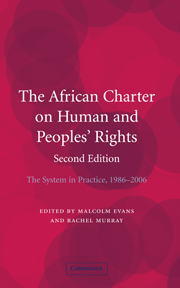Book contents
- Frontmatter
- Contents
- List of contributors
- Table of cases
- List of abbreviations
- Editors' Preface
- Introductory Preface: The African Charter and African Commission on Human and Peoples' Rights
- 1 The African Union and the Regional Human Rights System
- 2 The State Reporting Mechanism of the African Charter
- 3 Communications under the African Charter: Procedure and Admissibility
- 4 Evidence and Fact-Finding by the African Commission
- 5 Civil and Political Rights in the African Charter on Human and Peoples' Rights: Articles 1–7
- 6 Civil and Political Rights in the African Charter: Articles 8–14
- 7 Group Rights
- 8 The Role of Non-governmental Organisations and National Human Rights Institutions at the African Commission
- 9 A View from the Inside: The Role of the Secretariat
- 10 The Special Rapporteurs in the African System
- 11 Working Groups of the African Commission and their Role in the Development of the African Charter on Human and Peoples' Rights
- 12 The Creation of a New African Court of Justice and Human Rights
- 13 Protocol to the African Charter on the Rights of Women in Africa
- Bibliography
- Index
2 - The State Reporting Mechanism of the African Charter
Published online by Cambridge University Press: 01 July 2009
- Frontmatter
- Contents
- List of contributors
- Table of cases
- List of abbreviations
- Editors' Preface
- Introductory Preface: The African Charter and African Commission on Human and Peoples' Rights
- 1 The African Union and the Regional Human Rights System
- 2 The State Reporting Mechanism of the African Charter
- 3 Communications under the African Charter: Procedure and Admissibility
- 4 Evidence and Fact-Finding by the African Commission
- 5 Civil and Political Rights in the African Charter on Human and Peoples' Rights: Articles 1–7
- 6 Civil and Political Rights in the African Charter: Articles 8–14
- 7 Group Rights
- 8 The Role of Non-governmental Organisations and National Human Rights Institutions at the African Commission
- 9 A View from the Inside: The Role of the Secretariat
- 10 The Special Rapporteurs in the African System
- 11 Working Groups of the African Commission and their Role in the Development of the African Charter on Human and Peoples' Rights
- 12 The Creation of a New African Court of Justice and Human Rights
- 13 Protocol to the African Charter on the Rights of Women in Africa
- Bibliography
- Index
Summary
It was as long ago as 1961 that the idea of an African human rights court was put forward as a possible mechanism for addressing the issue of human rights abuses in Africa, but at that time it was considered to be too controversial a proposition to gain endorsement from the Member States of the Organization for African Unity (OAU). This is a reflection of attitudes that have long underpinned the African system, and that have led many African leaders over a considerable period of time to believe that sensitive issues of human rights violations could only be dealt with within a non-confrontational atmosphere. This approach is reflected in the procedures under the African Charter on Human and Peoples' Rights. The African Commission is the organ with the primary responsibility for promotion and protection of human rights under the African Charter, and it was confidently expected that such an atmosphere would prevail at its sessions once it was established. The two main mechanisms used by the Commission to monitor State compliance with their Charter obligations and to address human rights issues within Africa are the communication or complaints system, and the State reporting procedure established in Article 62 of the Charter.
Ultimately, the degree to which confrontation can be eliminated from the operation of a reporting procedure is determined by the quality of the participation of both sides.
- Type
- Chapter
- Information
- The African Charter on Human and Peoples' RightsThe System in Practice 1986–2006, pp. 49 - 75Publisher: Cambridge University PressPrint publication year: 2008
- 4
- Cited by



